
Theodoros Kolokotronis was a general and a leading figure of the Greek War for Independence in 1821, as well as a politician and country advisor.
He is also known as the Elder of Morias.
Kolokotronis was born on April 3, 1770, in Messinia to a known family. His father participated in the rebellion supported by Empress Catherine II of Russia in 1770, and was killed along with his two brothers by the Turks. As a result, Kolokotronis and his mother moved to her hometown in Arcadia, where he was raised. He soon entered the klepth groups of the area and became a captain when he was 15 years old. Having been a corsair at sea, in 1805 he participated in the naval missions of the Russian fleet, during the Russian – Turkish War. In 1806, a decree was announced for his persecution. He was chased by the Turks all over Peloponnese and eventually managed to escape on a boat to the then Russian territory of Kythera. In 1810, he went to Zakynthos and was enlisted in the Greek corps of the British army.
In 1818, he became a member of the secret organisation Filiki Etairia, which made the preparations of the Greek Revolution. He was present during the non – bloody liberation of Kalamata two days before the declaration of the war, which was set to 25 March 1821. He was a leader in various military actions during the Revolution in Peloponnese.
During the Civil War, he tried to settle the conflicts, but was eventually arrested and incarcerated in Nafplio along with his son. The Egyptians, allies of the Turks, attacked the Peloponnese and Kolokotronis was set free to lead the army once again. Although his army was quite small, the war continued for three years, using guerilla tactics. In 1828, the French army arrived in Peloponnese to repel the Egyptians.
He was a big supporter of Kapodistrias and his policies, and was a leader during the events of Otto’s enthronement. However, in 1833, he had a serious conflict with the Regents, eventually sending him and other heroes of the Revolution to prison in Nafplio, charged with treason. In 1834, he was sentenced to death, but after Otto’s coming of age, he received a royal pardon and became an “Advisor of the Country”. During the last years of his life, Kolokotronis dictated his Memoirs to Georgios Tertsetis, which were published in 1851 under the title A Narration of Events of the Greek Tribe from 1770 to 1836. This book has been an invaluable source of knowledge around the Greek Revolution of 1821.
Kolokotronis died in 1843 after a stroke, while returning from a celebration at the palace.
*Source: greece.com


